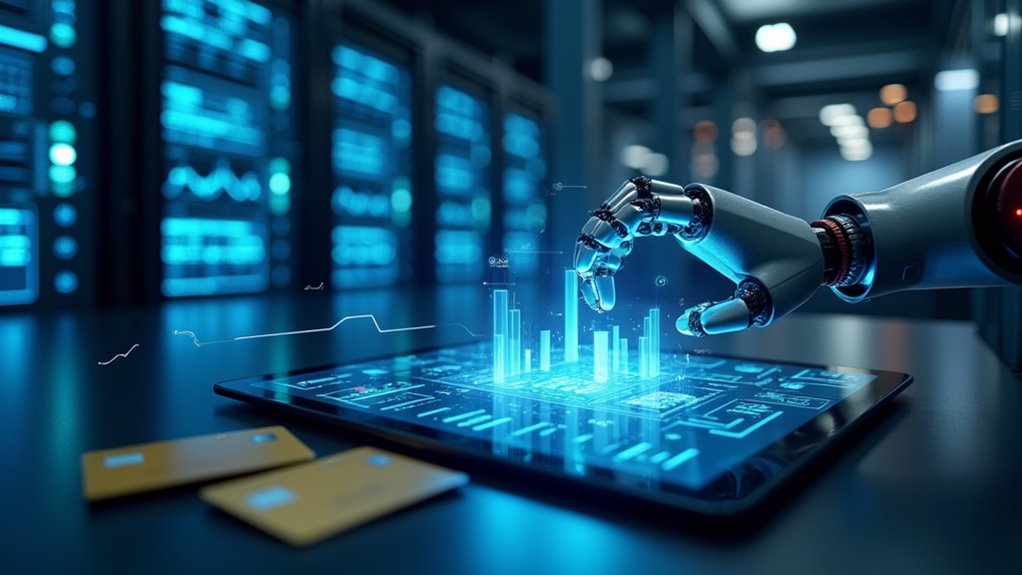AI is revolutionizing finance at breakneck speed. Traditional banking processes now happen instantly, with AI analyzing vast datasets in seconds while slashing error rates. Need service at 3 AM? Chatbots have you covered. Loan approvals happen in moments, not days. Fraud detection systems catch suspicious activity before your money vanishes, and sophisticated investment tools—once reserved for the wealthy—are now in everyone’s pocket. The financial system isn’t just changing; it’s being completely rewired. Discover how your wallet will feel the difference.

While traditional banking once moved at the pace of a leisurely afternoon stroll, artificial intelligence has jolted the financial world into a full sprint. The transformation is reshaping how institutions process data, serve customers, and manage risks—all at breathtaking speed. AI systems now crunch through mountains of financial information that would take human analysts weeks to review. This isn’t just about working faster; it’s about working smarter.
Banking’s leisurely stroll has become a full sprint—AI is revolutionizing finance with breathtaking speed and unprecedented intelligence.
And yes, there are legitimate AI Ethics concerns about algorithmic bias that could worsen existing inequalities, but properly implemented systems actually promote Financial Inclusion by making services accessible to previously underserved populations.
Gone are the days of mindless paper-pushing. AI automation handles repetitive tasks like transaction processing and compliance reporting, saving North American banks up to $70 billion. Your friendly neighborhood financial professional isn’t being replaced—they’re being upgraded, focusing on strategy instead of spreadsheets. Similar to healthcare AI, these systems augment human capabilities rather than replace professionals entirely.
Error rates? Plummeting. Efficiency? Soaring.
Customer experience has undergone nothing short of a revolution. Need financial advice at 3AM? AI chatbots don’t sleep. Want a loan approval without the week-long wait? AI algorithms can assess creditworthiness in seconds. The integration of conversational AI has transformed customer service with chatbots that can understand and respond to complex financial inquiries naturally. These systems deliver personalized financial guidance based on your actual spending habits, not generic advice from outdated playbooks.
Risk management has become proactive rather than reactive. AI systems flag suspicious transactions before fraud occurs, monitoring millions of data points simultaneously. Tools like Mastercard’s Decision Intelligence score transactions in real-time to significantly reduce instances of fraud while maintaining seamless customer experiences. They’re constantly scanning for money laundering patterns and regulatory violations that human eyes might miss.
Financial analysis now peers into the future rather than just reporting the past. AI identifies market trends, predicts customer behaviors, and spots anomalies that signal opportunities or dangers. Decision-making is faster, more accurate, and increasingly data-driven.
Perhaps most visible to everyday investors are AI-powered trading algorithms and robo-advisors. These systems execute trades at microsecond speeds and build personalized investment portfolios based on individual goals and risk tolerance.
The democratization of sophisticated financial tools means that advanced wealth management isn’t just for the ultra-wealthy anymore.
Frequently Asked Questions
Will AI Completely Replace Human Financial Advisors?
AI won’t completely replace human financial advisors.
While AI excels at data analysis and routine tasks, it lacks human intuition and struggles with ethical considerations that influence financial decisions.
The future points to hybrid models where AI handles number-crunching while humans manage complex emotional and ethical aspects of financial planning.
Trust matters, folks!
Different demographics will adopt AI-driven tools at varying rates, but the human touch remains irreplaceable for holistic financial guidance.
How Secure Are Ai-Powered Financial Systems Against Cyberattacks?
AI-powered financial systems face significant AI vulnerabilities despite sophisticated cybersecurity measures. These systems aren’t impervious to attacks—far from it.
While they detect patterns humans might miss, they’re only as secure as their latest update. Cybercriminals are developing equally advanced AI tools to penetrate defenses.
Financial institutions must continuously update their security protocols, implement multi-layered protection strategies, and maintain human oversight. The security arms race continues, with neither side holding a permanent advantage.
What Skills Do Finance Professionals Need to Adapt to AI?
Finance professionals need to sharpen their data analysis capabilities—no more hiding from those spreadsheets!
They must embrace machine learning concepts to stay relevant, or risk becoming obsolete faster than last year’s financial models. Technical skills like Python programming and visualization tools are non-negotiable.
The smart ones are already mastering automation, ethical AI application, and strategic thinking.
How Is AI Affecting Financial Inclusion in Developing Countries?
AI is revolutionizing financial inclusion in developing countries through innovative approaches.
Mobile banking platforms now reach remote villages where traditional banks fear to tread, while AI-powered microfinance solutions assess creditworthiness using alternative data.
Digital financial literacy tools demystify complex concepts for those previously excluded.
Let’s be honest—the digital divide remains a challenge, but AI-driven fraud detection is making financial services safer and more accessible for millions who were once financial outsiders.
Progress, not perfection.
Can AI Predict Market Crashes With Reliable Accuracy?
AI can’t reliably predict market crashes yet, despite impressive advances in predictive analytics. The problem? Those pesky “black swan” events that algorithms simply can’t anticipate.
Market sentiment analysis helps identify warning signs, but human behavior remains stubbornly unpredictable. AI models often struggle with overfitting to historical data, missing new patterns entirely.
While AI forecasting reaches 78% accuracy in ideal conditions, don’t throw away your human financial advisor just yet—AI works best as a complementary tool, not a crystal ball.









